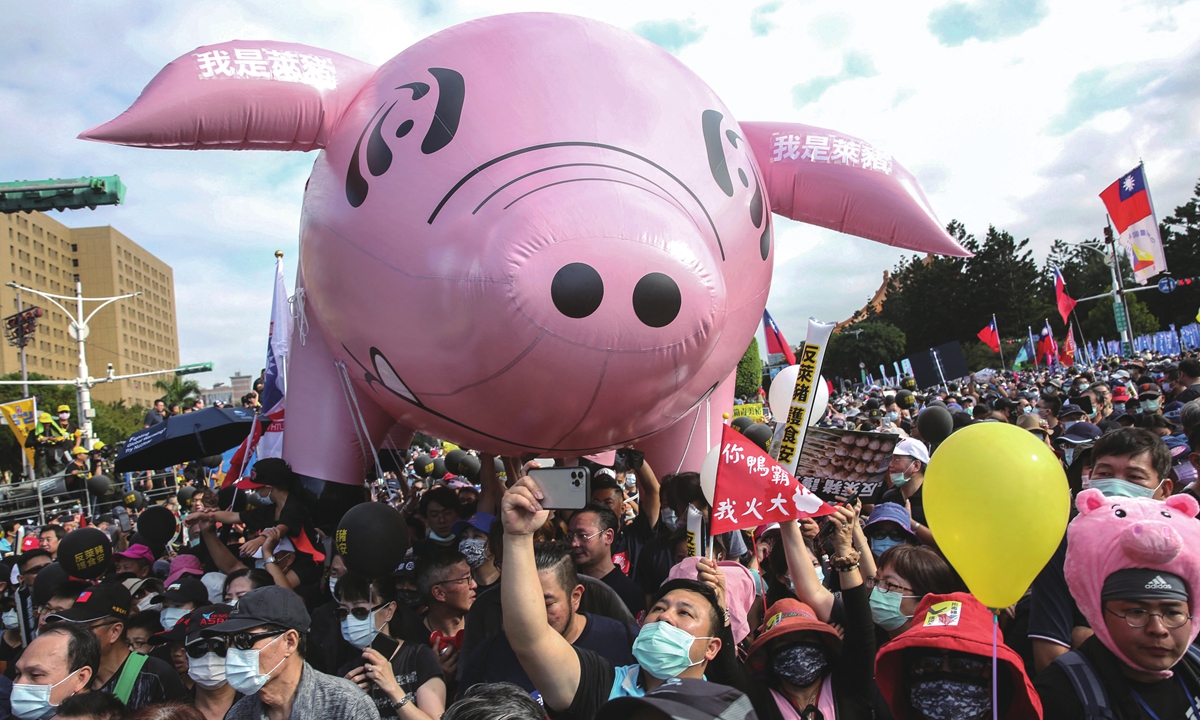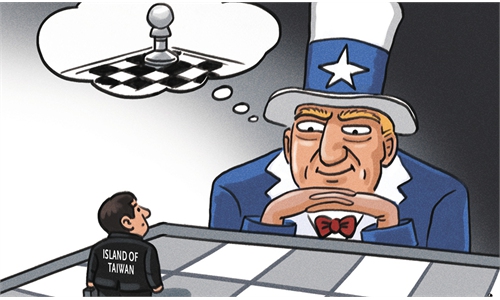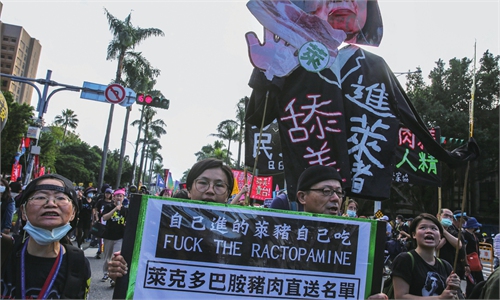Will ‘dictatorial democratic’ DPP allow Fukushima food imports to Taiwan for political gains?

People protest against the lifting of restrictions on US pork containing ractopamine feed additive, in Taipei on November 22, 2020. Photo:AFP
"817 [derogatory term referring to Taiwan regional leader Tsai Ing-wen and her supporters], you do have your fortune. As you wish, you will get ractopamine pork and Fukushima food. Please make yourselves at home and eat your fill."This is how some Taiwan people reacted as they learned that some politicians on the island support lifting a ban on food imports from five Japanese prefectures including Fukushima, which suffered a nuclear accident a decade ago.
Japan's Liberal Democratic Party (LDP) and Taiwan's Democratic Progressive Party (DPP) will hold a "2+2" meeting on Friday. Masahisa Sato, head of the LDP's foreign affairs division, said recently that the meeting will discuss the lifting of Taiwan's ban on Fukushima food imports. He believes that the anti-ractopamine pork referendum result will inject favorable influence.
Meanwhile on the island of Taiwan, the DPP authority hasn't directly responded to Sato's remarks, but Kuo Kuo-wen, a DPP "legislator" of the island's Legislative Yuan, said the Tsai authority should accelerate resolving this import ban. Kuo believes, since Taiwan people have accepted ractopamine pork previously, Fukushima food products should be no different. Besides, people from opposition parties also believe the agenda will be soon brought to the table.
What kind of government would poison its people, first with ractopamine pork and then food with nuclear contamination, just to cater to the US and Japan?
Dirty trick
After the "four referendums," the DPP became the "biggest winner," the Voice of America Chinese site reported bluntly.
Meanwhile, an American Institute in Taiwan official told Taiwan's media CNA in a statement that "We will continue to seek constructive engagement with Taiwan on issues that affect exports of US food and agricultural products, as we do in all areas of our trade relationship."
According to the BBC, Rupert Hammond-Chambers, president of the US-Taiwan Business Council, publicly stated after the Saturday referendums that the result shows a smooth path on the island to form "alliance" with like-minded partners in trade and security spheres.
The dire fact that Taiwan people have to eat ractopamine, which is banned in 160 countries and regions in the world, seems not to influence Tsai's good mood from being the "biggest winner." She complacently stated that the referendum results show that "Taiwan people's hope to become global and willingness to participate in international affairs." Perhaps what she meant by going global was that the food from nuclear accident-ridden areas in Japan will be in the daily meals of Taiwan people.
In the eyes of Japanese media, Tsai authority's efforts to overcome the referendums aim to blueprint the reopening of Fukushima food imports in the future in a bid to guarantee a ticket for the island to enter the Comprehensive and Progressive Agreement for Trans-Pacific Partnership (CPTTP).
Politics beyond people's health
Joining the CPTPP has been a strategic political and trade goal of the DPP authority. Long before the most recent referendum, many analyzed that the ban on Fukushima food is a hindrance for Taiwan's trying to reach that goal.
Recently, many in Japan and the island of Taiwan believe it is now or never. Some DPP "legislators" view imports of Fukushima food as the "most sincere" way to show sincerity to Japan, regardless of the huge health risks 23 million Taiwan people will face. The "four referendums" also make those unscrupulous politicians see a chance to cater to Japan. In the meantime, the DPP sees CPTPP membership as a vital method to counter the Chinese mainland. This being the case, they see lifting a ban on Fukushima food products as a must-be-done that shouldn't wait longer.
Wang Jianmin, a senior cross-Straits expert at Minnan Normal University, told the Global Times that the DPP authority now believes that it has a favorable climate to promote the import of Fukushima's food because of ractopamine pork. According to Wang, the reason that Japan took this opportunity to reiterate lifting the ban on imports of agricultural products from Fukushima is obviously linked with Taiwan's ambition to join the CPTPP. "Japan is using this as a bargaining chip to pressure the DPP," Wang said.
Singapore's major news outlet Lianhe Zaobao cited Taiwan Chung-hua Institution for Economic Research's Lee Chun, saying that Japan has equated the resolution of the Fukushima food issue with its support for Taiwan's joining of the CPTPP, so if the issue is not resolved, the attitude of Japan, a most important supporter of Taiwan's intention to join the CPTPP, will be compromised.
Da Zhigang, director of the Institute of Northeast Asian Studies at Heilongjiang Provincial Academy of Social Sciences, told the Global Times that although the Friday "2+2" meeting is semi-official, people like Sato have influence in the LDP and they can use their power to pile pressure within the party and thus influence the Diet.
"It is highly likely that Fukushima food imports will be discussed during this Friday's meeting, as it can be associated with the CPTPP topic. And the CPTPP can be linked with issues such as containment of the Chinese mainland, security, liberal values, economic order, and so on," Da said, noting the DPP's greenlighting of Fukushima food will possibly make the Kishida government show more favor toward Taiwan in the future.
'Dictatorial democracy'
Fukushima food is a very sensitive issue in Taiwan for people who attach importance to food security. The promotion to reopen the imports opposes the people's wishes and is bound to backfire in Taiwan society. However, the Japanese government hasn't given up piling pressure on the DPP over this issue. The reason is simple: Taiwan is the weakest point to breakthrough among the remaining countries and regions where Fukushima foods are still blacklisted.
Wang believes that the DPP is very likely to restart Fukushima imports, given the current situation. One reason is that the DPP has a strong desire to deepen its relations with Tokyo, while the other is that the DPP thinks the public backlash may not be as fierce as expected after the anti-ractopamine pork referendum failed.
The DPP launched a referendum in 2018 regarding importing food from Fukushima and four other Japanese prefectures but didn't nail it. But if the DPP continues to push forward the imports, it is likely to choose a method other than a referendum.
"It is risky to rely on referendums. Although many people voted no in the referendum on banning imports of pork with ractopamine, the margin was small. Therefore, if the DPP authority really pushes forward the import of Japanese food with nuclear radiation, the referendum is quite likely not to be passed," said Wang.
Wang noted that if the Tsai authority thinks it necessary, it can forcefully decide to reopen imports for the sake of politics and to win the support and courtship of Japan, in exchange for Japan's support of its CPTPP membership.
At that time, the food safety issue that the Taiwan public currently attaches enormous importance to will be totally ignored by the DPP authority. The Tsai authority, by manipulating public opinion, has long hijacked the so-called democracy. The referendum, which is supposed to reflect public opinion, is nothing but a formality. With the support of the green camp, the Tsai authority will only make decisions based on politics instead of people's feelings and interests.
Self-proclaimed as democratic and progressive, the DPP is considered by some Western forces as a model of democracy in Asia. However, according to Wang, democracy has been trampled since Tsai assumed office. The DPP does not respect public opinion at all, but exercises a kind of bossy dictatorship. "Authoritarianism has been revived in Taiwan. The DPP's bossy and arbitrary behavior can be compared to the era of Chiang Kai-shek and Chiang Ching-kuo," Wang said.
Therefore, people not only need to criticize the secessionist behavior of the DPP authority, but also realize and reveal the anti-democratic bullying act of the DPP, Wang noted.
The dining table of the Taiwan public will become the trash bin of the US and Japan. The health of Taiwan people has become the stepping stone for the DPP to curry favor from its foreign masters. While the DPP authority laughs, 23 million Taiwan people suffer.
The author is a reporter with the Global Times. opinion@globaltimes.com.cn


